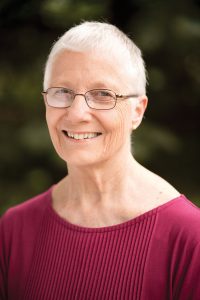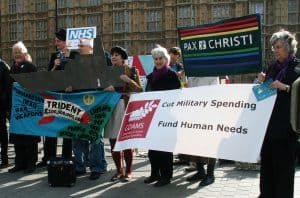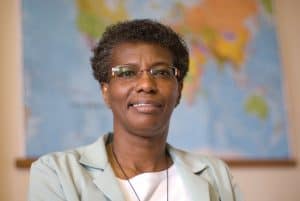Q&A with Marie Dennis ’64
Q&A with Marie Dennis ’64
 Prior to 2007 when you became the co-president of Pax Christi International, a global Catholic peace movement, you were the director of Maryknoll’s Office for Global Concerns. What brought you to have a passion to work toward justice and peace?
Prior to 2007 when you became the co-president of Pax Christi International, a global Catholic peace movement, you were the director of Maryknoll’s Office for Global Concerns. What brought you to have a passion to work toward justice and peace?
MD: I have been working for justice and peace since the early 1970s, thanks to the impact of Vatican II and Catholic social teaching, which was so richly articulated during and after the Council. Also, through my parish and an ecumenical program in the county where we lived, I had become friends with people in our community who were impoverished. I knew one family very well and was horrified that they could be so poor in what was perceived as a fairly wealthy county. It seemed to me to be exactly what documents like “Justice in the World” and “Call to Action” (both from 1971) were addressing and I began to understand the difference between charity and justice.
What made you focus on the biggest picture – international peace?
MD: For as long as I have been doing this work, peace has been a major part of my focus, but it was always deeply connected to social justice and respect for the integrity of creation. In the 1970s and 1980s, the focus was on nuclear disarmament, but the militarization of U.S. foreign policy, the wars in Central America and the human lives, the talent and the treasure spent on war and preparations for war were of great concern to me. I became involved with Pax Christi (initially with Pax Christi USA, and later, with Pax Christi International) in the late 1980s, but in my work for Maryknoll there were many other issues on my agenda. When I was elected co-president of Pax Christi International in 2007, I began to see the many, many dimensions of working for peace – and to believe that without peace, human dignity and a healthy planet are impossible.
 Pax Christi has taken a stand on many things that reach far into the injustices of other countries. You take a hard stand against the use of armed drones overseas, for instance. What other issues is Pax Christi committed to that might not be on the top of the traditional peace issues list?
Pax Christi has taken a stand on many things that reach far into the injustices of other countries. You take a hard stand against the use of armed drones overseas, for instance. What other issues is Pax Christi committed to that might not be on the top of the traditional peace issues list?
MD: A few examples –
- We are supporting our member organizations in Japan working to retain Article 9 in the Japanese Constitution prohibiting Japan from having an offensive military.
- We are supporting the people of South Sudan, especially civil society groups there, as that new country writes its constitution.
- We are helping to reintegrate former combatants into their local communities in the Democratic Republic of Congo.
- We sponsored a fast during Lent in solidarity with the people of Syria and will deliver messages of support to Syrian refugees living in Jordan, Lebanon and Turkey.
- We brought former gang members in Haiti together to play soccer for peace.
- In the U.S. we are committed to becoming an anti-racist organization.
- We have consultative status at the United Nations, working there for human rights in many different countries, as well as for disarmament.
- We work to make more visible the links between war and climate change.
- And while nuclear disarmament has slipped off the screen of many people, Pax Christi is still working hard to rid the world of these insane and useless weapons.
What about women? Is justice and equality for women a top concern for Pax Christi?
MD: Of course! Not only do war and violent conflict affect women in many terrible ways (rape is a common weapon of war), but the evidence is very clear that women are extremely effective peacemakers, yet very few women are included in official peace processes or negotiations. Pax Christi women have deep experience in many different peacemaking and peace building methodologies. Further, Pax Christi changed our own leadership structure in 2007 from having a bishop president to having co-presidents, one a bishop and one a woman.
What can one person do to help work for social justice? What would be the first step that any reader could take toward that end?
MD: Pay attention to the reality around you and around the world; try to look through the “lens” of people on the receiving end of injustice or violence; seek sources of information that are alternative to main stream news; join others (an organization or community that shares your values) in discerning how to act in response to a given injustice; act; then reflect on your action in the light of your values. Prayer is an essential dimension of Pax Christi’s “action plan.”
You are a world traveler, promoting human rights, justice and peace amid some of the world’s fiercest conflicts.
What was the most moving trip or most memorable person you met?
MD: I have met so many amazing people doing wonderful work for peace and social justice. This is a hard question to answer, but I think the most moving trip was to El Salvador in 1986 to accompany a community of about 500 campesinos/as as they moved back to their land from a displaced persons’ camp in San Salvador where they had been living for years. Their village had been attacked by the Salvadoran army and they were forced to flee, but after seven-plus years, they had decided to go home in spite of still very dangerous conditions in the countryside. After a long day traveling on buses that were repeatedly stopped at checkpoints, we stopped for the night a few miles from their cooperative land. It was unsafe to go farther then because they were afraid that the roads were mined. As the community, including many children, began to unpack the supply trucks and settle in for the evening, a young woman community leader spoke to calm their fears with deep conviction about their right to return to their land. From the Book of Amos, Chapter 9, she reminded them that theirs was a journey in the hands of God – that they would “rebuild ruined cities and live in them; plant vineyards and drink their wine; make gardens and eat their fruit.” The next day the internationals accompanying the community were arrested, held overnight and eventually deported from El Salvador. Overcoming tremendous odds and fear after we were arrested, the community continued on to their land. And, despite ongoing harassment by the army, they stayed in El Barillo, rebuilt their village and planted their fields. Each of us who accompanied them received a few black beans and kernels of corn from their first harvest.
What is one outcome Pax Christi International helped with or accomplished that you are most proud of?
MD: Pax Christi International is quite decentralized, so there are different accomplishments in different places. Pax Christi sections in Europe were deeply engaged in support of dissidents behind the Iron Curtain during the Cold War and, encouraged by the Vatican, Pax Christi International maintained a substantive dialogue with the Russian Orthodox Church during the same period. Pax Christi Netherlands brought Joseph Kony (Lord’s Resistance Army) to the negotiating table with the government of Uganda. Pax Christi groups in the eastern Democratic Republic of Congo have consistently sponsored activities to promote nonviolence in the midst of horrific violence. Pax Christi was deeply involved in the Landmines and Cluster Bomb Treaties.
The new Pope Francis is the first Jesuit pope, credited with living a simple life and working for social and economic justice. What are your hopes and expectations for the new pope’s leadership?
MD: I am most heartened by Pope Francis’ relationships that are obviously important in his own life – especially his relationships with poor people and even women. We learn so much from the relationships we have with people different from ourselves. Because the struggles of ordinary people are more real to him, I hope Pope Francis will make the Church more relevant to contemporary life. I also hope that he will make Catholic social teaching a more central part of Catholic education and catechesis.
What are your hopes and aspirations for the next decade in our ever-more-global world?
MD: My hope is that the witness and energy of so many millions of people striving to create a more just and peaceful world will begin to have some impact. The level of violence in our own society is unconscionable. To create a culture of peace will require a tremendous shift of priorities at a popular level. My hope is that such a shift will begin to happen.
What one thing would you persuade the U.S. government to change, if you could?
MD: A redefinition of security is essential if we are ever really going to make peace. We have been told that higher fences and bigger weapons will make us secure, but we all know that real security comes from having a safe place to live, food on the table and vibrant communities filled with love. We need to ratchet down our approach to security – focusing on excellent policing that is respectful of human rights rather than military might. So changing the very definition of security – shifting from national security to human and earth security – is extremely important. If I could name more than one, though, I would say end targeted assassinations using lethal drones; close Guantanamo and end indefinite detentions that violate international human rights law; eliminate all nuclear weapons; and invest in human needs and ecological restoration rather than military might.
Understanding that humankind may always fight over resources and religion, what essentials need to be in place in order to make great strides toward world peace and social justice?
MD: Formal and informal education that promotes values of peace and nonviolence; a global authority based on the principle of subsidiarity that has the power to hold transnational financial, economic and political powers accountable to the common good; a shift toward sustainability in the lifestyles of people in the northern hemisphere.
You lived on a 65-acre farm in Lovettsville, Virginia, for nine years. What did your experiences there teach you and your family?
MD: Besides many great lessons about growing and caring for plants, animals and the land, we learned about the value and gift of hard physical work and the essential nature of our relationships with each other, with the earth and with other creatures. It was a huge gift to have those years of working hard together as a family and it was great fun. We lived very simply but had an extremely high quality of life. I wish we could do more to pass it on!
You choose to live in community as a secular Franciscan. Why did you choose this path, and what does it mean to you? You are also the first lay co-president of Pax Christi International. How does that influence the work of Pax Christi? How does that influence your own faith journey?
MD: Assisi Community, where I have been a member since 1986, is committed to living simply together and to working in some way for social transformation. I believe that is the way the Gospel calls us to live in a world where the majority of people struggle to survive and the earth is under significant threat. In the community, we have a very high quality of life, real security and the support of friends for work that is difficult and demanding. We also have a lighter “footprint” on the earth. That I am the first lay president of Pax Christi International is both gift and challenge. I am very grateful to Pax Christi for this honor and proud of the statement it makes in a Church where leadership is so often dominated by men. It challenges me to unfailing generosity in the time and energy that I devote to the work for peace and to the celebration of the amazing peacemakers I meet around the world. This experience has nourished my spirituality with a deep and abiding hope.
Read more about the work of Pax Christi International at www.paxchristi.net
 Sr. Patricia Chappell, SND, a former member of the Trinity Board of Trustees, became the executive director of Pax Christi USA in 2011, after serving a variety of leadership positions within her religious community and in youth ministry.
Sr. Patricia Chappell, SND, a former member of the Trinity Board of Trustees, became the executive director of Pax Christi USA in 2011, after serving a variety of leadership positions within her religious community and in youth ministry.
In an interview with the Catholic News Service, Chappell said she wants to reach people in the pews to understand that Pax Christi’s work is rooted in Catholic social teaching: “We have to try to find some kind of way of having the priorities make sense to the ordinary people in the pew. We’ve got to move it from an abstract theoretical concept to making it real for the people in the pews and trying to find practical ways where we can invite people to be part of this movement.”